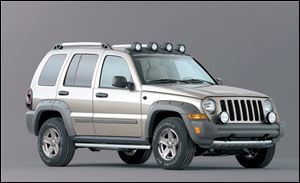
Chrysler vs. Washington
A confrontation over a proposed Jeep recall benefits no one; a voluntary resolution is far preferable
6/6/2013
This undated file photo provided by Chrysler shows the 2005 Jeep Liberty Renegade. Chrysler is refusing a request by U.S. safety regulators to recall about 2.7 million vehicles to fix fuel tanks.
Chrysler Group LLC had better know what it’s doing.
The Detroit automaker, in an extraordinary act of defiance, is rejecting a federal regulator’s request that it recall and fix 2.7 million Jeep vehicles, many of them made in Toledo. The dispute affects Jeep Grand Cherokee sport-utility vehicles built during the 1993 to 2004 model years, and Jeep Liberty SUVs from the 2002 to 2007 model years.
The National Highway Traffic Safety Administration says the design of the vehicle’s plastic fuel tanks is defective and — with the tanks’ placement behind the rear axle and height above the road — makes the Jeeps prone to gasoline leaks and fires in rear-end collisions. The agency cites 37 such crashes that led to fires, resulting in 51 deaths.
Current models of the vehicles have fuel tanks in front of the rear axle. But Chrysler insists the tanks on the older vehicles “do not pose an unreasonable risk” and meet government safety standards. Company executives dispute the federal analysis of crash statistics, and say the collisions cited by regulators are “extremely rare” in any event.
The recall and repairs the federal agency is seeking would cost Chrysler a lot of money; estimates range from $300 million to more than $1 billion. Chrysler earned $1.7 billion last year.
But inaction could be at least as expensive for Chrysler, and perhaps more so. Automakers generally comply with federal requests for recalls, rather than run the risk of creating consumer perceptions, fair or not, that their cars and trucks are dangerous.
A recall does not shield a car company from liability for crashes and injuries, but it can enable the automaker to claim it is showing concern for its customers and other motorists. It can spare the company a lot of bad publicity, as well as the potential of added scrutiny by regulators.
When the Japanese automaker Toyota was seen as dragging its feet on a safety recall several years ago, its sales suffered and its previously pristine reputation for quality took a hit. The company has yet to recover fully.
Jeep SUVs are among Chrysler’s most popular and profitable models. Any loss of consumer confidence in them could prove devastating to the Jeep brand.
And critics already are noting that a bailout funded by U.S. taxpayers enabled Chrysler to emerge from bankruptcy in 2010, at about the same time that federal regulators launched the safety investigation of the Jeeps.
Although federal regulators cannot force Chrysler to recall the Jeep SUVs, they can hold public hearings and release details of their investigation. If Chrysler continues to balk, they could levy big fines against the automaker, and ultimately take it to federal court.
Such a confrontation would do neither the company nor its customers any good. What happens to Chrysler has a disproportionate impact on the Toledo area, given Jeep’s vital presence here.
Chrysler and government regulators say they want to keep talking. If good will and reason prevail in the recall dispute, a voluntary resolution that both sides, as well as consumers, can live with remains possible — and desirable.